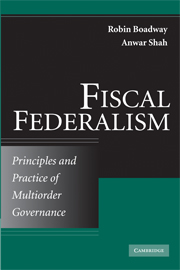PART FOUR - CHALLENGES AND RESPONSES
Published online by Cambridge University Press: 05 June 2012
Summary
Part IV addresses several potential drawbacks to fiscal federalism: macroeconomic instability, a race toward the bottom, widening regional disparities, and a higher incidence of bribery and corruption. These claims are scrutinized by having recourse to available conceptual guidance and empirical evidence. In addition, the part also addresses newer challenges to fiscal federalism arising from globalization and the information revolution.
In a flat (globalized) world, “nation-states are too small to tackle large things in life and too large to address small things” (Bell 1987: 13–14). But federal fiscal systems to accommodate either “coming together” or “holding together” pose a threat to macroeconomic stability according to some writers, who argue that decentralized governance structure is incompatible with prudent fiscal management and even regional fiscal equity. Chapter 14 investigates the conceptual and empirical bases of these arguments. More specifically, the chapter questions whether risks of macroeconomic mismanagement and instability are greater with decentralized fiscal systems and assesses macroeconomic management in federal versus unitary countries.
The strengths and weaknesses of fiscal and monetary policy institutions under alternate fiscal regimes are examined, drawing upon neo-institutional economics perspectives on fiscal institutions. A neo-institutional economics perspective aims to reduce transactions costs for citizens (principals) in inducing compliance with their mandates by various orders of governments (agents). A fiscal system that creates countervailing institutions to limit the opportunistic behavior of various agents and empowers principals to take corrective action is expected to result in superior fiscal outcomes.
- Type
- Chapter
- Information
- Fiscal FederalismPrinciples and Practice of Multiorder Governance, pp. 461 - 463Publisher: Cambridge University PressPrint publication year: 2009



